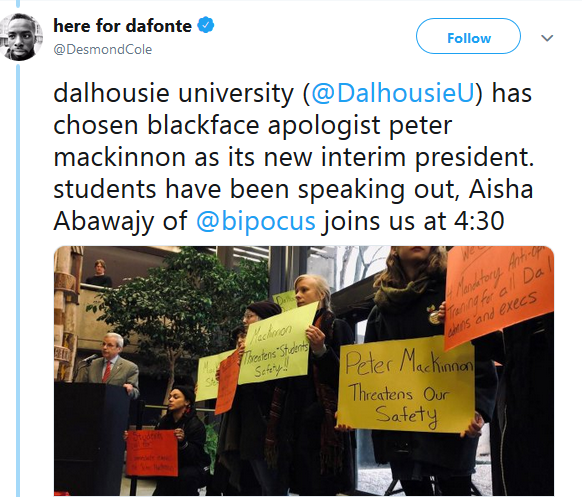You have /5 articles left.
Sign up for a free account or log in.
Blackface controversies have set off debates at American universities, whether about recent incidents at the University of Oklahoma or the medical school yearbook of Virginia's governor. Now a book written to shed light on how universities handle disputes over free speech has set off a debate about blackface … in Canadian academe.
The book is University Commons Divided: Exploring Debate & Dissent on Campus (University of Toronto Press). The book explores a number of incidents in which students and professors at Canadian universities have had their speech rights threatened, in some cases related to controversial things they have said. The author is Peter MacKinnon, interim president of Dalhousie University, in Nova Scotia, and formerly president of the University of Saskatchewan.
In one section of the book, he describes incidents at the University of Toronto and Brock University in which students dressed for Halloween as members of Jamaica's bobsled team, with blackface part of their costumes. He also describes an incident at Queen's University, where costumes depicted people from a variety of national backgrounds. The incidents are from 2009 on.
MacKinnon does not defend the various ways students portrayed themselves and people from other races and cultures. But he questions how these incidents were condemned and became the subject of widespread debate, with some comparing the students to those who would wear Nazi uniforms.
"If there was insensitivity to issues of race in the selection of costumes by party-goers at the three universities, there was also a lack of proportion in the responses to them," he wrote. "These were Halloween parties, not cultural misappropriations, Nazi mimicry, or manifestations of disapproval of other peoples. So describing them [as such] risks diminishing real problems of intolerance, discrimination and racism. It also risks backlash from a bewildered public observing these episodes."
In Canada, as in the United States, many students and professors view blackface as hateful, not a costume faux pas.
 Students have called MacKinnon a "blackface apologist" and demanded his removal. He released a statement that he does not "condone blackface."
Students have called MacKinnon a "blackface apologist" and demanded his removal. He released a statement that he does not "condone blackface."
This week professors have demanded that the university release a statement on its policies on blackface, and to state that wearing blackface is a form of harassment of other students and demeans them in violation of the university's codes.
"These statements [in the book] have caused us concern about how Dalhousie’s policies could be applied to similar facts, should they arise here. Imagine that a student or employee attends a Halloween party on campus wearing blackface in October 2019. Would our policies result in any sanction for their behavior, or the response that it was 'just a party'?" said the letter, signed by 28 faculty members.
They added, "It is our view that reasonable people know or ought to know that wearing blackface would make other people feel demeaned, intimidated or harassed. The meaning or significance of this practice cannot be separated from its painful history, and this history is indelibly marked by racism. Blackface cannot be understood in isolation from historical and ongoing practices of invoking the imagery of African enslavement for the purposes of amusement for non-black people. We are concerned that this history and the harms of blackface are at risk of being minimized at Dalhousie, as is the inclusion of the black and racialized communities in our understanding of who counts when identifying the 'reasonable person' and what all of us should be expected to know."
The university released a statement to Inside Higher Ed stating that it does condemn blackface and views it as a serious problem.
"There has been a lot of recent conversation in our local, national and international communities about blackface," said the statement. "Dalhousie would like to make a very clear statement. Blackface is absolutely unacceptable and wrong. All forms of racism, including blackface, are an affront to our values as a university and will not be tolerated at Dalhousie University. Having a safe, supportive and respectful environment for all members of our community is our highest priority. The University’s Statement on Prohibited Discrimination clearly outlines our commitment to safeguarding students and employees against all forms of prohibited discrimination in their work or study or their participation in the university more generally. When an incident comes to the university’s attention, a number of policies -- including the Student Code of Conduct and Statement on Prohibited Discrimination -- could apply depending on the circumstances … Building a community where we all feel like we truly belong is a priority at Dalhousie University."




